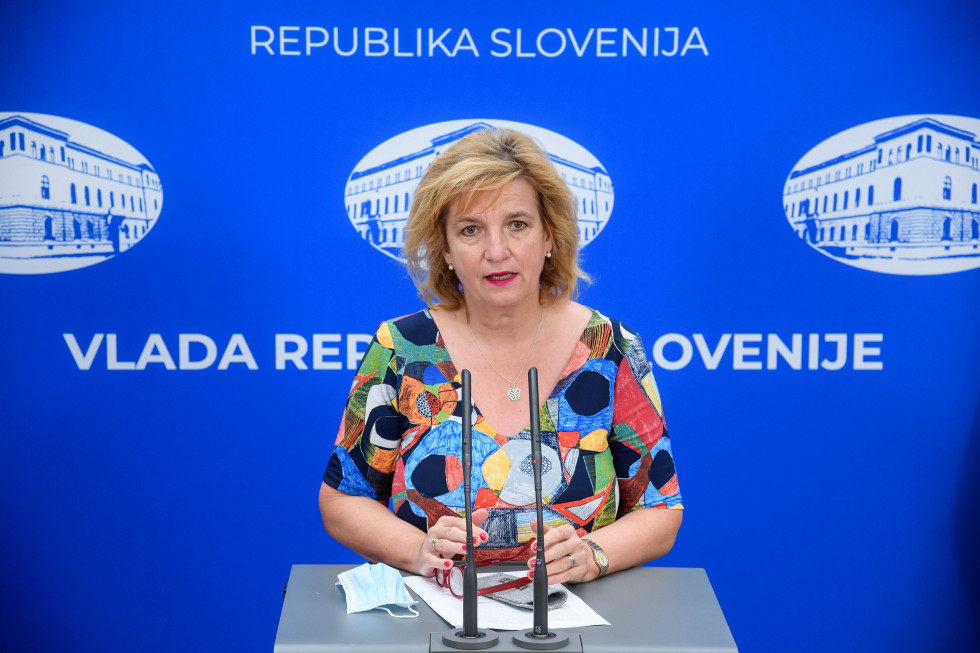"The epidemic is a test of solidarity and wisdom. We cannot say that we can’t do it."
Currently, there are 17 persons hospitalised in Slovenia, three of them in need of intensive treatment; one person has died. The total number of active cases of infection in the country is 242, which is four more than on Sunday. In addition to the spread of the virus within the country, the number of imported infections has been increasing again, especially on return from holidays. There have been more than five such cases in recent days, noted Dr Beovič. These persons were not infected in nightclubs, but during their stay at a tourist destination. Another strong source of current infections is workplaces, which account for 40% of all infections reported in the last 14 days.
Due to the falling number of imported infections, the Government will not change the border regime, as this trend is precisely the result of more effective entry rules, especially for arrivals from Serbia, Bosnia and Herzegovina, and Kosovo. The situation in Croatia is not sufficiently controlled by its government, as evidenced by the occurrence of individual imported infections, and there exists a risk of infection, so the Netherlands has already recommended that its citizens return home.
According to Dr Beović, the goal of the Government and the Expert Group at the Ministry of Health is to maintain the current fluctuation in cases, or to promptly contain outbreaks with the help of the epidemiological service. Such an approach can be successful if all members of the chain are in place: immediate medical examination by a doctor in the event of symptoms, testing, appropriate and rapid microbiological diagnostics, a number of daily cases that is sufficiently low for them to be analysed and contained by epidemiological services in the field, and strict adherence to isolation or quarantine instructions.
Transferring all patients with COVID-19 from care homes to hospitals makes little sense
The head of the expert group also responded to the calls of the Association of Social Institutions of Slovenia for the transfer of all patients with COVID-19 from care homes to hospitals and other suitable facilities for the isolation of patients. According to Dr Beović, that makes little sense. The first, and most important, reason is the fact that the mode of transmission of the virus causing COVID-19 is not such that hospitalisation or isolation in another facility would be mandatory in itself, as would be the case with Ebola, for example. And secondly, there is no room to hospitalise or place all patients with COVID-19 from care homes. If they were hospitalised, due to the resulting overcrowding, multiple health programmes, intended mostly for the same population of elderly people, would have to be cancelled, thus leading to contradictions inside the same population group. The transfer of all patients with COVID-19 from care homes to other institutions could lead to the mindset that care home workers would not have to intensively deal with the prevention of the infection themselves as the care homes would only wait for the patients to be taken care of by others.
Therefore, Dr Beović emphasised the cooperation of all participants – the ministries, the Association of Social Institutions of Slovenia, the directors of care homes, as well as hospitals and primary healthcare centres – as being key to success. She said that disputes over this issue would lead to nowhere and would certainly not benefit the residents and patients in care homes. She also emphasised that the epidemic has affected everyone. The hospitals also had to reorganise and restructure due to a lack of space and poor personnel capacity without being asked whether they wanted to do so.
Wearing a mask helps contain the spread of the virus
Regarding the opinion issued yesterday by the Human Rights Ombudsman that the act of not wearing a mask cannot be punished, she underlined the importance of wearing a mask, which helps contain the virus from being spread to other people during the presymptomatic phase. Such was the case with the infected case worker in the Hrastnik Care Home. If she and other employees had been wearing a mask, the spread of the virus to others during the period from the infection until the detection of clear symptoms would have been minimal.
Posnetek novinarske konference glede stanja epidemije covid-19


